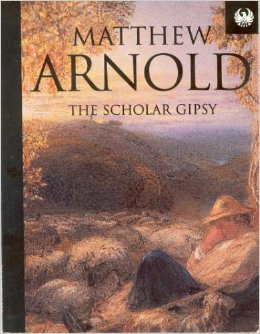Matthew Arnold’s poem, The Scholar Gipsy, which is taken from a 17th century Oxford story found in Joseph Glanvill’s The Vanity of Dogmatizing. It has, on many occasions, been called one of the finest and most popular of Arnold’s poems.

The way the poem is introduced is an extract from Glanvill, which weaves around the story of an impecunious Oxford student who left his studies to join a band of gypsies. He sucked up to them who eventually told him many of the secrets of their trade.
As time passed, he was discovered and identified by two of his former Oxford associates, who ascertained from him that the gypsies, “had a traditional kind of learning among them, and could do wonders by the power of imagination, their fancy binding that of others.” When he had gained the knowledge of all that the gypsies had taught him he said, he would leave them and reveal those secrets to the world.
This poem is described as a pastoral poem. In the twenty-five ten-line stanzas, Matthew Arnold provides the indispensable elements of the legend in lines 31 through 56 of the poem. A pleasant August afternoon is how the poem opens, with the poet-shepherd sending away his companion shepherd to take care of his usual pastoral errands, bidding him to return in the evening when the shepherd and his companion will refurbish their quest.
Not only was the of the Cumner country in “The Scholar-Gipsy”, a great accomplishment, but is also a significant aspect of the poem.
The very lucid depiction of the pastoral landscape in the dream vision is generally and justly appreciated for its charm, its visual accuracy, and fidelity to nature. Admiration of this section, almost to the exclusion of the rest of the poem, has been long the stock response to the poem.
Arnold’s idiom succeeds admirably in capturing and recreating authentically the unique beauty and feel of the countryside in the neigbbourhood of Oxford, which he knew intimately and loved. There is a view of the poem, based obviously on this section, that Arnold indulges here his nostalgic longings for his undergraduate days at Oxford, and that the poem offers only “a very delightful pastoral week-end.”
While examining the different parts of the poem, and the different functions they are made to serve, this fact has to be kept in mind. Arnold exhibits a substantial amount of skill in structuring them into a unified poem.
It has been argued that Matthew Arnold’s poem `The Scholar-Gipsy’ entails little optimism and belongs to Arnold’s poetry of negation. The background information on the spirit of the era during which the poem was born was the principle reason for the poet’s interest in a tale from Glanvill. An uncharacteristic resemblance to the poems of Keats is very noticeable.